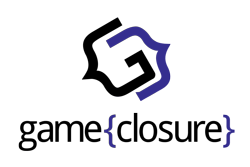Gaming is changing fast these days, especially in the browser. Sure, social games are great and everything, but there’s always been a sense that, as browser-based technologies mature, the opportunities that present themselves will make casual social, Facebook-only gaming look crayon scrawl. Inherently, one of the best parts of gaming is that it’s inherently social, and gamers want deeper, more interactive experiences — from console to free-to-play online games.
Of course, enabling deep, multiplayer experiences puts a lot of stress on the technology and the game’s engineers (coding, synchronizations, de-buggings, oh my!) — even with how far HTML5 has come, it’s still a pain in the butt and can be expensive. That’s where Game Closure entered the picture. We were the first to cover Game Closure back when they launched at the “demo day” of SSE Labs, Stanford University’s student-run startup accelerator. (Now known as StartX.)
At the time, Game Closure described itself as a gaming version of Heroku and Appcelerator, but, for the uninitiated, that means that the team has built a game development environment and SDK, which makes it easy for developers to create, host, and deploy HTML5-based, cross-platform, multiplayer games – on iOS, Android, and Facebook. But what’s really cool about this, especially given where the space was as recently as a year ago, is that the development environment itself doesn’t require additional software, plugins, etc., all you need is your browser.
Mobile and social gaming are already growing like weeds, so there’s an untapped market and lots revenue potential from all the new users on-boarding as those platforms scale, but there’s also a lot of fragmentation, resulting in an increasing demand (among both experienced and novice gamers) for cross-platform availability. To be successful, developers have to be there. That’s why we’ve been seeing the big players like Zynga and EA, who were once content with being one-platform wonders, not only scramble to launch on multiple platforms, but offer direct-to-consumer services, and increase their frequency at which they turn out viable, robust games.
Game Closure has, in part, made that latter obstacle their top priority, and last summer they’d gotten to a point where they believed they could realize cross-platform push with all the bells and whistles in as little as four to six weeks. (For context, this is a task which typically takes developers six months to a year to do.)
So, at Google I/O last summer the team launched its first game, called Popstar Defense, in about five weeks, as proof that its game development tools could be used to create a workable gaming experience, purely written in HTML5. The team has since released a few more games, with some going live, and while some of them have missed, they each represent a step closer to a more powerful gaming technology.
This caught the attention of investors, and less than six months after incorporating officially as a company, Game Closure closed a seed round from an impressive list of investors, including SV Angel, Yuri Milner, Joi Ito, Charles River Ventures, Benchmark Capital, Greylock Partners, and General Catalyst Partners. In addition to investing in Game Closure’s seed round, Joi Ito, who has served on the board of DeNA, advises Zynga and Twitter, and runs the MIT Media Lab, also joined the startup as an advisor.
But, we’ve heard that it’s not only investors who were interested in the startup. Quite a few of the big players are lacking in their HTML5 strategies, and Game Closure as a young company, looked like a good steal. In fact, the Game Closure CEO confirmed that the company has had “significant inbound acquisition interest” from Facebook, Zynga, GREE, Motorola, and several others. What’s more, our reliable sources close to the deal indicated that Zynga put out the highest bid, its acquisition interest pushing into the $100 million range.
The team turned down these offers, choosing to go it alone. And now a year from launch, the startup has grown to a team of 26 and is adding more coin to its coffers to support its independent exploits, announcing today that it has closed a $12 million series A round, led by new investor Highland Capital Partners, with contributions from existing investors, Greylock, Benchmark, General Catalyst, and CRV, bringing the startup’s total to just under $13 million.
Carter tells us that they were particularly excited by the fact that Highland Capital’s participation was led by Partner Andy Miller, who has quite a bit of mobile experience to his name, having sold Quattro Wireless to Apple for $275 million, whereupon he joined the company as VP of its iADs platform, and recently left Apple to join Highland.
As to what’s next, the team has recently added analytics and multi-language translation into its game development experience, and, going forward, is looking to add monetization structures to the mix. Right now it’s working with game studios to optimize their HTML5 and mobile gaming experiences, and in the future we might see them tack to a broader focus.
For more, check out Game Closure at home here.
